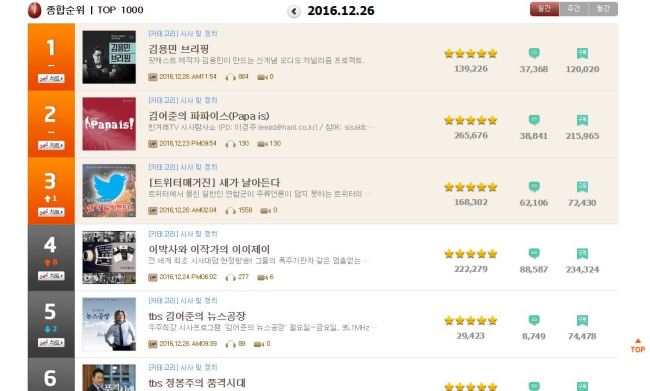The recent Choi Soon-sil scandal that involves some of Korea’s politicians, business moguls and media pundits has caused citizens to take to the streets in protest for the last 10 weeks. Much of the public outrage has targeted traditional media for failing to keep corruption in check which has resulted in many people seeking alternative news sources.
Podbbang, Korea’s first and largest podcast platform, has stepped in to fill this void.

Top six broadcasts in Podbbang list. From top to bottom includes “Kim Yong-min‘s news briefing,” “Kim Eo-joon’s Papa is,” “Tweeter news: Birds flocking in,” “Dr. Lee and author Lee’s objection,” “tbs Kim Eo-joon‘s news factory,” and “Chung Bong-joo’s elegant time.”
Last week, the company announced that it won a 1 billion won ($828,000) investment from a venture capital Central Investment Partners, signifying its popularity.
Podbbang was set up in March 2012. It was launched by a video sharing platform Tagstory as a web service and as a part of project business motivated by the “Nakkomsu (Na Neun Kkomsu Da – I am a weasel)” craze that had gained nationwide popularity in the previous year for its explicitly critical content of the Lee Myung-bak administration.
“We noticed that this would be a business opportunity as the crowd wanted intriguing in depth content which seeks the truth,” Kim Dong-hee, CEO of Podbbang told The Korea Herald.
Starting from an audio platform that offered an audio service of popular TED lectures and a re-listening service of local radio broadcasts, Podbbang has since grown into an influential alternative media outlet with more than 9,000 shows on average in real time and 600,000 listeners each month.
The company has since changed its name from Tagstory to Podbbang and turned into a mobile app service in 2013.
The main source of revenue comes from advertisements which are mentioned by the host during a show, as well as commercials in between shows.
While the method deviates little from traditional media, Podbbang’s own marketing solution “Podbbang Ad” says that it measures an accurate number of listeners with their registered profile, unlike radio broadcast stations which is limited to listeners nearby.
“We forecast that our sales from audio advertisements will reach 20 billion won, approximately 10 percent of the entire local radio advertisement market,” said Kim.
Aside from audio advertisements, Podbbang also gains revenue from renting a broadcast studio for 10,000 won per hour.
Podcast hosts receive a portion of the advertisement costs or receive funding from fans. The show themes vary from politics and economy to hands-on tips on real estate investment and even testimonies from North Korean defectors.
Kim attributes Podbbang’s diversity to the virtually free regulation on internet-based content
“Content from newspapers, television and radio are subject to the current media regulations,” said Kim.
“This has pushed content makers to fearlessly broadcast whatever they want based on their own logic.”
Currently, six of the 10 most popular Podbbang shows are news. Some are independently hosted by former members of the hit Nakkomsu show, while others briefly explain real time reactions from social media or news reports from the scene.
Kim said there is more in store for Podbbang in line with the vast advancements of new technologies.
He explained that connected cars, for instance, can serve as new opportunities for the service to expand its presence as an alternative to traditional radio by offering tailored and mobile content.
“Regulation-free has been a launch pad from Podbbang to dramatically grow. But (this also) means that if new regulation is made to restrict diversity and freedom of expression from local podcast content, it would threaten the majority of our news content,” Kim said.
By Song Ji-won (
jiwon.song@heraldcorp.com)

![[Herald Interview] 'Amid aging population, Korea to invite more young professionals from overseas'](http://res.heraldm.com/phpwas/restmb_idxmake.php?idx=645&simg=/content/image/2024/04/24/20240424050844_0.jpg&u=20240424200058)




